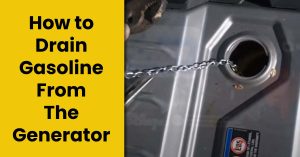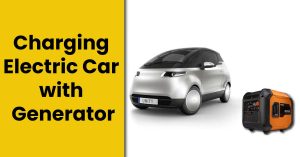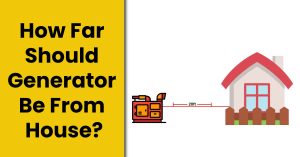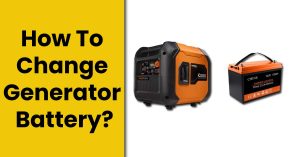Diesel Vs. Gas Generators – Which One Is More Reliable?
The main difference between the diesel and gasoline generators is the initial and ongoing cost, diesel generators have a higher initial cost but lower ongoing cost, whereas gasoline generators have a lower initial cost and higher ongoing cost.
Quick Comparison of Diesel Vs. Gas Generators
| Parameters | Diesel Generators | Gasoline Generators |
|---|---|---|
| Initial Cost | High | Low |
| Ongoing Cost | Low | High |
| Fuel Efficiency | High | Normal |
| Fuel Availability | Not radially available | radially available |
| Safety Features | Ultra Safe due to normal flammability | Normal Safety due to High flammability |
| Noise Levels | High | Low |
| Cold Weather Performance | Struggle in Harsh winter | Instant startup |
| Maintenance | Easy | A bit hectic, and also needs regular maintenance as well |
| Life Span | longer | normal |
Diesel Generator Vs. Gas Generator (Detailed Comparison)
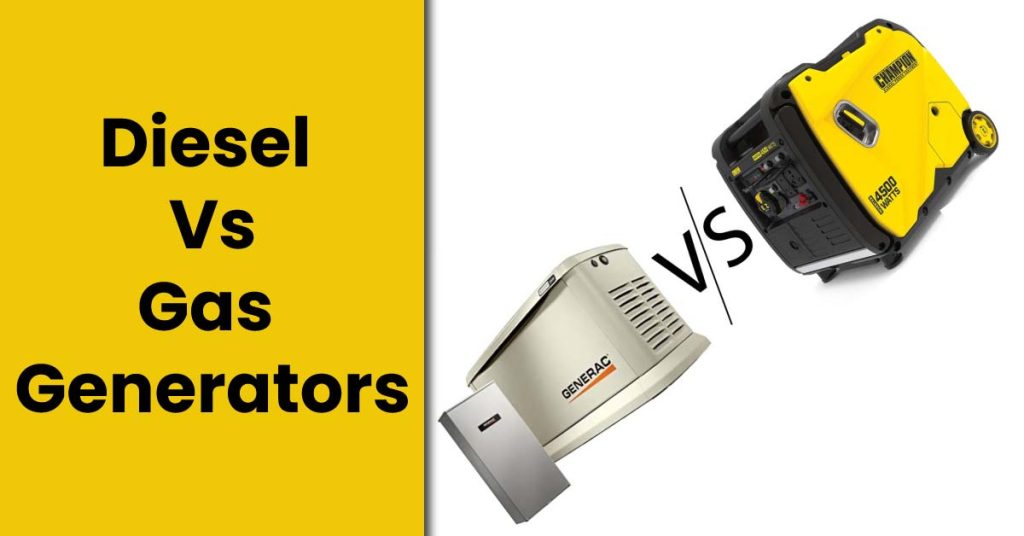
Initial and Ongoing Cost:
Though the initial cost of Diesel generators is more because of the complex mechanisms, huge sizes, and durable parts, still the ongoing cost is way cheaper because of the non-ignition combustion mechanism and better fuel efficiency. A diesel engine doesn’t require to be tuned up or parts replacement regularly, however, a gasoline engine needs a regular tune-up and parts replacement sometimes.
As per our experience, a normal-sized diesel generator can cost you $900+; however, a normal-sized gasoline generator will cost you about $300.
Gas vs. Diesel Generator Efficiency:
Diesel generators provide more efficiency as they work on non-ignition systems which ensure to burn minimum fuel, also they have a higher compression ratio due to the heavy engines.
A typical diesel engine contains a compression ratio between 14:1 and 25:1, however, the gasoline engine’s compression ratio ranges from 8:1 to 12:1.
Fuel Availability:
I found both fuels easily, however, in some regions, you may struggle to find the diesel but it’s very rare since every gas station use to have both gasoline and diesel.
Safety Features:
Both are safe because the modern generators come with the EPA and CARB certifications, still, if you are more conscious about safety and you are going to get a bigger unit, go for a diesel generator since diesel is not that flammable.
Noise Levels:
Diesel generators are louder compared to gasoline, though there are newer units of Generac and other renowned brands that are silent compared to the traditional diesel gen-set still you need a bigger one with a proper enclosure, however, in the case of gasoline you can get a super silent to unite even under 5000 watts.
the bottom line is a diesel generator can’t compete with a gasoline unit which only produces 55 – 65dB from 30 – 40fts.
Maintenance:
Since a diesel generator doesn’t have a spark plug and carburetor you don’t have to maintain it regularly, I am doing maintenance of my Generac Guardian 24kW after 12000 – 15000 hours, however, my champion 4500 watts inverter generator needs maintenance right after 6000hrs. Moreover, during the maintenance of the diesel generator, I found less corrosion in the exhaust however in the case of gasoline I found way more.
Lifespan:
Like diesel car engines diesel generators are well known for their longevity, since diesel fuel doesn’t need harsh combustion, you will find a clean and perfect engine even after running for 40000 to 50000 hours. Also, the life span depends on the quality of the product and size, large generators may last longer because of premium and durable parts, however, smaller units may last slightly less but way more than a normal gasoline unit.
Which One Is ECO Friendly?
Both are equally harmful to the environment, though diesel emits less CO2 and NOx (Greenhouse Gases), still, it still emits more harmful particulate matter compared to gasoline, so we can’t weightage one over the other.
Checkout our comparison about Standby and Portable Generator
How Much Diesel Does a Generator Use Per Hour?
| Generator Size | Fuel Consumption in Liters at 25%/hr | Fuel Consumption in Liters at 50%/hr | Fuel Consumption in Liters at 75%/hr | Fuel Consumption in Liters at 100%/hr |
|---|---|---|---|---|
| 8 – 10Kw | 0.8 – 09 | 1.3 – 1.6 | 1.8 – 2.2 | 2.4 – 2.9 |
| 12 – 20kw | 1.1 – 1.8 | 1.9 – 3.1 | 2.7 – 4.5 | 3.6 – 6.0 |
| 24 – 40kw | 2.2 – 3.6 | 3.7 – 6.2 | 5.4 – 9.0 | 7.2 – 12.0 |
| 60 – 80kw | 5.4 – 7.2 | 9.4 – 12.5 | 13.5 – 18.0 | 18.0 – 24.0 |
| 200 – 400kw | 18 – 36.0 | 31.2 – 62.4 | 45.0 – 90.0 | 65.0 – 120.0 |
| 500 – 600kw | 44 – 55 | 84.1 – 100 | 120 – 143.2 | 162.2 – 194.5 |
| 750kw | 70 | 124.5 | 178.6 | 242.76 |
Advantages and Disadvantages of Diesel Generators
Advantages and Disadvantages of Gas Generators
Which one should I choose?
It depends on the needs of the user if you need a smaller unit for camping or a worksite go for a gasoline unit since they are cheaper, portable, and most importantly you will find gasoline at any fuel station.
In case you need a bigger unit for your whole house, go for a standby diesel unit that can work on both natural gas and diesel as well. A bigger diesel unit would be a great investment for a whole house since it doesn’t require regular maintenance, the fuel cost will be lower and most importantly they are safer and can provide a decent lifespan.
FAQs – Frequently Asked Questions
Why Are Diesel Generators More Expensive?
Diesel generators are a bit costly compared to gasoline generators Because of heavier components that can sustain higher cylinder pressure and a super durable engine that can last longer. In short diesel generators are solely built for the whole house with premium stuff, however, gasoline generators are built for multiple purposes.
How long can a diesel generator run continuously?
Most of the industry’s experts and manufacturer believes that you can run a standby diesel generator for 450 – 500 hours by maintaining the coolant, engine oil, etc. but I recommend using it for 12 – 13 hours and giving it a break of 1 – 1.5 hours and check out the oil condition and coolant right after 28hrs.
Can you run a house on a diesel generator?
Yes, the diesel generators are solely built to run the whole house.

Josh is a highly skilled electrician with specialized expertise in the field of generators. With years of experience under his belt, he has established himself as an expert in all aspects of generators, ranging from installation and maintenance to troubleshooting and repairs. Josh’s in-depth knowledge of electrical systems and his commitment to staying updated with the latest industry advancements make him a reliable and sought-after professional.

